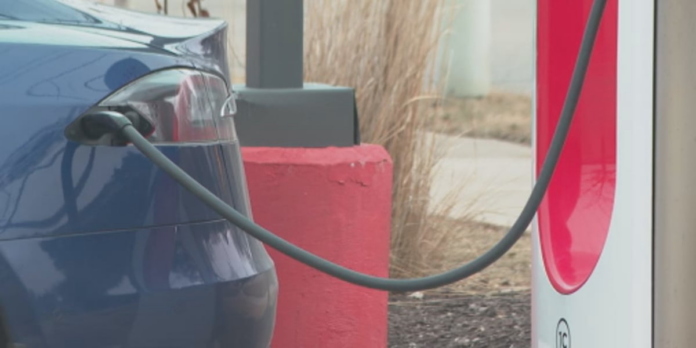MADISON, Wis. (WMTV) – The new year means new laws, and in Wisconsin, one of them is a newly imposed tax on electric vehicle owners.
Effective January 1, 2025, an excise tax of 3 cents per kilowatt-hour will apply to EV owners who charge their vehicles at public charging stations. The revenue generated will be collected by the Wisconsin Department of Revenue and directed toward statewide road maintenance.
“They’re trying to offset those revenues and basically find a way for folks who drive electric vehicles to pay at the pump,” managing director with State Smart Transportation Initiative Chris McCahill said. “The same way folks who drive gas cars do.”
Wisconsin native Eric Wallin is now driving his second electric vehicle.
“I got my first EV, a couple-year-old Nissan Leaf, in November of 2019,” he said. “I didn’t like dependence on foreign oil. I didn’t like paying for gas, I knew that was obviously problematic for the environment.”
Regarding the new EV charging tax, Wallin feels it is fair.
“A lot of EVs, especially people who are buying EV SUV and EV trucks are way heavier than the gas versions,” he said. “They’re going to do more damage to the roads, and are just heavier, they wear on the roads more. So, if we’re going by weight, they should be paying more.”
However, McCahill argues that EV owners in Wisconsin already contribute $175 annually.
“I think a lot of those folks are probably already paying more than someone who drives a gas car in a lot of cases,” he said. “So with this additional charge on the charging stations, a lot of folks might be paying double what someone driving a gas car might pay.”
McCahill, an advocate for sustainable and equitable transportation, expressed concern that these new fees might discourage some people from purchasing electric vehicles. He pointed to neighboring states like Minnesota, which offer incentives like a $2,500 rebate for buying an EV and a $250 credit for tolls.
Despite the new tax, Wallin believes owning an electric vehicle remains worthwhile for daily commuting.
“I mean for me, charging is still way cheaper than what I was paying for gas, especially as little as I use the car, it’s way cheaper than gas,” McCahill said. “I would ask people to kind of reassess where they can go, how far they’re going on a daily basis, and really think about can you do that with a 300-mile range car.”
The exact amount that drivers will have to pay will vary depending on the vehicle’s efficiency, driving habits, and frequency of charging.
Click here to download the WMTV15 News app or our WMTV15 First Alert weather app.
Copyright 2025 WMTV. All rights reserved.


